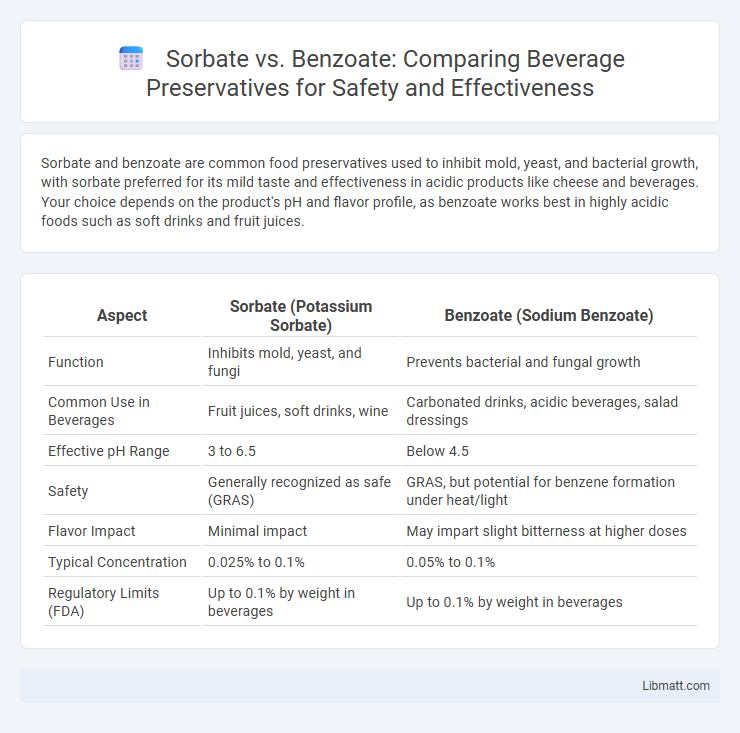Sorbate and benzoate are common food preservatives used to inhibit mold, yeast, and bacterial growth, with sorbate preferred for its mild taste and effectiveness in acidic products like cheese and beverages. Your choice depends on the product's pH and flavor profile, as benzoate works best in highly acidic foods such as soft drinks and fruit juices.
Table of Comparison
| Aspect | Sorbate (Potassium Sorbate) | Benzoate (Sodium Benzoate) |
|---|---|---|
| Function | Inhibits mold, yeast, and fungi | Prevents bacterial and fungal growth |
| Common Use in Beverages | Fruit juices, soft drinks, wine | Carbonated drinks, acidic beverages, salad dressings |
| Effective pH Range | 3 to 6.5 | Below 4.5 |
| Safety | Generally recognized as safe (GRAS) | GRAS, but potential for benzene formation under heat/light |
| Flavor Impact | Minimal impact | May impart slight bitterness at higher doses |
| Typical Concentration | 0.025% to 0.1% | 0.05% to 0.1% |
| Regulatory Limits (FDA) | Up to 0.1% by weight in beverages | Up to 0.1% by weight in beverages |
Introduction to Food Preservatives
Food preservatives such as sorbate and benzoate play a critical role in extending shelf life and preventing spoilage by inhibiting mold, yeast, and bacterial growth in various food products. Sorbate, commonly used as potassium sorbate, is effective in acidic foods like cheese and baked goods, while benzoate, typically sodium benzoate, excels in acidic environments such as soft drinks and fruit juices. Both preservatives are recognized for their safety by regulatory agencies when used within recommended limits, ensuring consumer protection and product quality.
What Are Sorbates?
Sorbates, commonly used as food preservatives, are salts or esters of sorbic acid that inhibit the growth of mold, yeast, and fungi, extending the shelf life of various products. You will often find potassium sorbate and calcium sorbate in items like cheese, baked goods, and beverages due to their effectiveness and low toxicity. Their ability to maintain freshness without altering flavor makes sorbates a preferred choice in both commercial and home food preservation.
What Are Benzoates?
Benzoates are salts or esters of benzoic acid commonly used as preservatives in food and beverages to inhibit the growth of mold, yeast, and certain bacteria. Sodium benzoate is the most prevalent benzoate, effective at acidic pH levels below 4.5, making it ideal for acidic products like soft drinks and fruit juices. Your choice of preservative depends on the product's pH, as benzoates perform best in acidic environments compared to sorbates, which have a broader pH range effectiveness.
Chemical Structures and Properties
Sorbate, specifically potassium sorbate, features a sorbic acid backbone with conjugated double bonds, making it an effective antimicrobial agent primarily against mold and yeast. Benzoate, typically sodium benzoate, consists of a benzene ring attached to a carboxylate group, which imparts strong bacteriostatic activity in acidic environments. Differences in their chemical structures contribute to their distinct solubility, stability, and spectrum of preservative efficacy in food and cosmetic formulations.
Mechanisms of Preservation
Sorbate and benzoate preservatives inhibit microbial growth by disrupting cellular function and metabolism, effectively extending product shelf life. Sorbate primarily targets fungal cells by interfering with their enzyme systems, while benzoate acidifies the internal pH of bacteria and yeast, preventing reproduction. Your choice between these preservatives should consider the specific microbial challenges and product pH for optimal preservation efficacy.
Effectiveness Against Microorganisms
Sorbate and benzoate are both effective preservatives but target different microorganisms. Sorbate is particularly effective against molds and yeasts, inhibiting their growth in acidic foods and beverages, while benzoate is more potent against bacteria, especially in acidic environments with a pH below 4.5. Your choice between these preservatives should consider the specific microbial threats in your product to ensure optimal protection and shelf life.
Common Food Applications
Sorbate and benzoate are widely used preservatives in the food industry due to their effectiveness in inhibiting mold, yeast, and bacterial growth. Sorbate is commonly applied in cheese, baked goods, fruit juices, and acidic foods, while benzoate is frequently found in carbonated beverages, salad dressings, and acidic condiments like pickles. Both preservatives function best in acidic environments, making them ideal for processed foods with low pH levels.
Safety and Regulatory Status
Sorbate and benzoate preservatives are widely recognized for their safety and regulatory approval, with sorbates generally favored for their lower allergenic potential and broader acceptance in natural and organic products. Benzoates are subject to stricter limits due to potential adverse reactions and are regulated by authorities such as the FDA and EFSA, ensuring safe usage concentrations in food and cosmetics. Understanding these distinctions helps you choose preservatives that comply with safety standards while meeting product formulation needs.
Health Considerations and Allergies
Sorbate and benzoate preservatives differ in their potential health effects and allergy risks; sorbates are generally considered safer with low allergenic potential, while benzoates may trigger allergic reactions and asthma symptoms in sensitive individuals. Benzoates can also cause skin irritation and have been linked to hyperactivity in children, whereas sorbates are less associated with such adverse effects. Monitoring consumption of benzoates is crucial for those with pre-existing allergies or sensitivities to avoid exacerbated health concerns.
Choosing the Right Preservative
Choosing the right preservative between sorbate and benzoate depends on the specific food product and its pH level, as sorbate is more effective in acidic environments while benzoate works best below pH 4.5. Sorbate, known for inhibiting molds and yeasts, is often preferred in baked goods and fruit products, whereas benzoate effectively controls bacteria and yeast in beverages and acidic foods. Your selection should consider the preservative's antimicrobial spectrum, regulatory limits, and potential flavor impacts to ensure product safety and quality.
Sorbate vs benzoate (preservatives) Infographic

 libmatt.com
libmatt.com